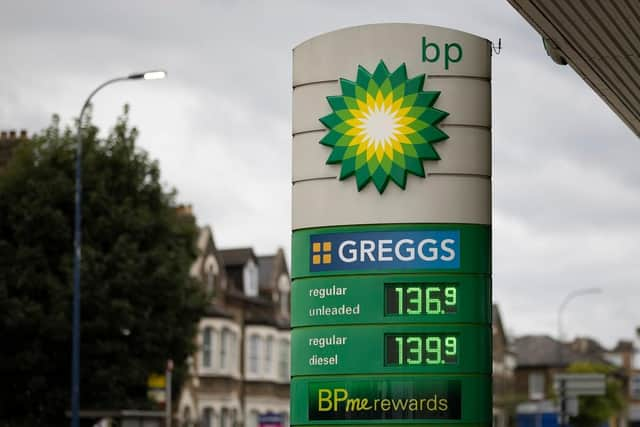Russia-Ukraine: Why are petrol prices rising following the Russia and Ukraine war? How to save money on fuel - the RAC explains
This article contains affiliate links. We may earn a small commission on items purchased through this article, but that does not affect our editorial judgement.
Drivers have been warned to expect a sharp increase in fuel prices following the invasion of Ukraine today (February 24).
Petrol and diesel prices have hit a new high record on Tuesday (February 22), according to a market analyst, and industry onlookers are predicting further spikes as the crisis between Russia and Ukraine affects global oil markets.
Advertisement
Hide AdAdvertisement
Hide AdFigures from data firm Experian Catalist reveal that on February 22, the average cost of a litre of petrol in the UK reached 149.30p, while diesel cost 152.68p.


On the morning of February 24, the price of Brent crude oil reached an eight-year high at $102.30 per barrel and fuel retailers are predicted to pass any price rises onto drivers.
Simon Williams, the fuel spokesman for RAC, said: “Both petrol and diesel reached new record levels yesterday. Unleaded is nearly 149.5p a litre and diesel almost 153p.
“Russia’s actions will now push petrol pump prices up to £1.50 very soon. The question then becomes where will this stop and how much can drivers take just as many are using their cars more and returning to workplaces.
Advertisement
Hide AdAdvertisement
Hide Ad“If the oil price were to increase to 110 US dollars per barrel there’s a very real danger the average price of petrol would hit £1.55 a litre.
“This would cause untold financial difficulties for many people who depend on their cars for getting to work and running their lives as it would skyrocket the cost of a full tank to £85. At $120 a barrel - without any change to the exchange rate which is currently at $1.35 - we would be looking at £1.60 a litre and £88 for a full tank.”
AA president, Edmund King, said: “Russia’s attack on Ukraine and resulting geopolitical uncertainty has pushed Brent crude above 100 US dollars per barrel for the first time since 2014.
“This will result in hikes in prices at the pumps. New record fuel prices are likely any time soon.”
Advertisement
Hide AdAdvertisement
Hide AdFuel prices have been increasing consistently over the last 12 months as the need for oil to return to pre-pandemic levels has become increasingly high and key producers continue to limit their supply.
Russia’s actions in invading Ukraine have worsened the situation as it is among the world’s biggest oil producers and there are growing fears over disruption to oil supplies, resulting in higher wholesale prices.
How to save money on fuel
The RAC has outlined eight key tips on how to save your fuel, saving you lots of money.
Step 1
Make sure you maintain your vehicle; regular maintenance and servicing enhances the efficiency of your vehicle, improving your fuel consumption.
Step 2
Advertisement
Hide AdAdvertisement
Hide AdGently use your right foot while in the highest gear possible within the speed limit.
Excessive speed causes your vehicle to guzzle high levels of fuel, so having a light right foot and making sure all acceleration is gentle is crucial to fuel-efficient driving.
Step 3
Anticipate, try not to lose momentum.
Keeping the car moving smoothly at the right speed is vital to fuel economy.
Step 4
Only use cruise control when driving on a constant flat surface as this is the only way it benefits fuel economy.
It is best used for driving on a motorway.
Step 5
Don’t get dragged down.
Advertisement
Hide AdAdvertisement
Hide AdThis basically means, don’t leave your roof bars and roof box on as they create wind resistance and cause your car to use more fuel when driving via the ‘drag’ effect.
Step 6
Try to avoid overusing the air conditioner unless you really have to as it uses engine power and therefore increases fuel consumption.
Step 7
Combine journeys; a warm engine is more efficient.
Consider making one round trip rather than various short trip; once the engine is warm it will operate at its most efficient, while several cold starts will increase fuel consumption.
Step 8
Lighten the load as your fuel consumption increases the heavier your vehicle is.
So make sure not to keep any unnecessary items in your boot as they all add weight to your vehicle.
Comment Guidelines
National World encourages reader discussion on our stories. User feedback, insights and back-and-forth exchanges add a rich layer of context to reporting. Please review our Community Guidelines before commenting.